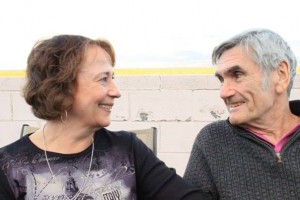—Socrates, classical Greek (Athenian) philosopher,
credited as one of the founders of Western philosophy; 470/469 – 399 BC
One of the most wonderful moments of freedom for any human being is that total awareness of the truth (with a capital “T”) that I cannot teach anybody anything. Yes, it is a dichotomy, and no, it is not denial. An expansion of awareness changes everything, because nothing needs changing.
My mother and dad argued incessantly. I am quite sure I remember their having argued about whether the sun came up in the east. One of the funniest memories of their blame-game, had to do with the early morning ritual of their getting up and turning on the kitchen light, and then sitting in the semi-dark dining room smoking cigarettes and drinking coffee. On this particular morning, my mom realized she had on my dad’s glasses. Noticing my dad was also wearing her glasses, she blurted out, “Howard, you’ve got on my glasses!”
A moment later, my dad shot back, “Well, you’ve got on mine!” Only after the heat of the moment had cooled down, were they both able to laugh about the fact that each had thought a vision problem had occurred. Perhaps, afraid a confession would hex their eye health, each had sat in near-blindness, nursing the fear, without speaking the truth of it to the other.
Over the course of my lifetime, I am sure I have repeated (while not the same content) that pattern of blame many times. Every group I have been in has provided me with ample opportunity to see this pattern clearly and bring sanity to it by knowing I cannot teach anybody anything. I can only make them think.
In Being with Dying, Joan Halifax writes, “Like the sympathetic string on a sitar, you can awaken these qualities in another simply by being genuinely kind and aware yourself. It is not what we do but how we are that makes it possible for another to discover their own natural compassion and openness towards suffering and the unknown.” (p. 105)
Recently, several people in a group I really enjoy being part of became embroiled in a power struggle. I was able to see the point of view of each of those involved, more clearly than I was able to recognize any particular point of view of my own. I was transported back several years to a previous experience where values clashed and relationships were torn apart. With social media, instant messaging, and email communication, in an instant, words can be spoken that make things go from bad to worse.
What allows one to lose perspective and slip under the spell of “my way or the highway” thinking? More importantly, how does one develop the relational skills to remain kind in the face of unkindness and respectful when being disrespected? How do you turn the other cheek without becoming a doormat; become the change you want to see in the world?
Many ways exist for us to be more conscious in our relating, and the following exercise might jog other helpful ideas for you. You will focus on an individual you are in a close relationship to, and write down your answers as though you were being asked the question by this significant person.
Four Questions of Nonviolent Communications by Marshall Rosenberg
Question 1:
What is one thing I do or do not do that makes life less than wonderful for you?Question 2:
When I do this thing, how do you feel?Question 3:
What needs of yours are not getting met?“I feel as I do because I would have liked _____ (or because I was wanting, wishing, or hoping for ______.)”
Question 4:
What can I do to enrich your life?
When challenges come up with any individual or group you care about, write down your answers as though you were being asked the question by a significant person. Think about expressing, “I feel as I do because I would have liked _____ (or because I was wanting, wishing, or hoping for ______).”
Overcome any significant risk to the relationship by asking, “What can I do now to make the situation better?” This allows you to remain confident a solution is possible and committed to being part of bringing that solution forth.
Note* Psychologist Marshall Rosenberg died on Saturday, February 7th. Rosenberg was the creator of Nonviolent Communication and the founder and director of educational services for the Center for Nonviolent Communication. What a marvelous legacy he leaves for our world. Here he is with my friend, Christina Cusumano, who is one of the many to carry on his vision. RIP Marshall, you will not be forgotten….

